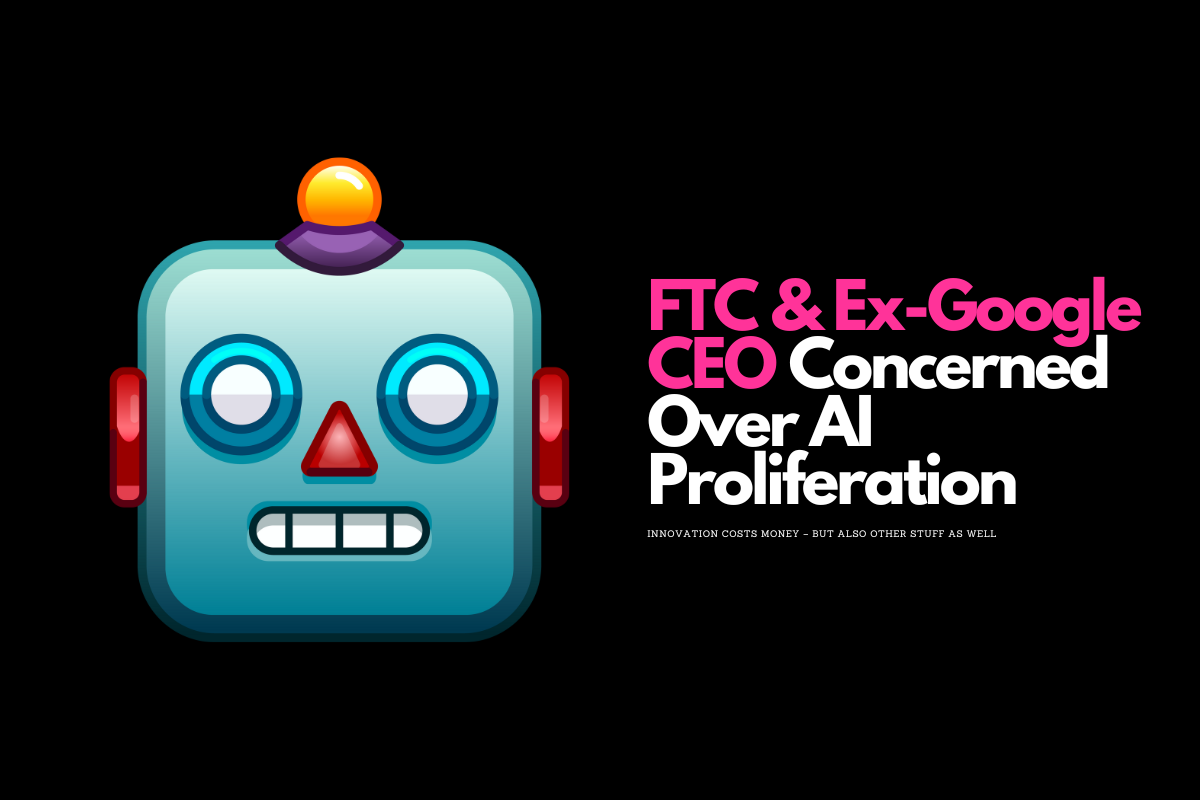The FTC is seeking insights on AI fraud, competition, and privacy. Ex-Google CEO Eric Schmidt is also a little worried about AI’s potential…
TL;DR
FTC & Eric Schmidt Actively Concerned About AI
- 🚨 AI and Fraud Prevention: The FTC questions how AI is enhancing fraud and scams and the effectiveness of current safeguards by major platforms.
- 📊 Data Access and Competition: There are concerns about how prior access to large datasets impacts competition and innovation, and how firms leverage market power in adjacent areas to gain an advantage in AI.
- 💸 Algorithmic Pricing: The FTC is examining the adoption of algorithms by companies for pricing and offerings, and how third-party pricing platforms handle sensitive competitive information.
- 👁️ Commercial Surveillance: The evolution and accuracy of commercial surveillance mechanisms, particularly for individualized pricing and privacy protection claims, are under scrutiny.
- 🔒 Security and Cryptography: The FTC is interested in factors that encourage developers to address security vulnerabilities and improve the usability of advanced cryptographic techniques.
- ⚖️ AI Model Weights: The impact of widely available AI model weights on competition and the potential for open-weight models to resist behavior-shaping techniques during fine-tuning is being questioned.
- 📱 Design and Mental Health: The design choices by social media, gaming platforms, and devices are being evaluated for their potential to exacerbate or mitigate mental health issues, especially among children and teens.
- 🎓 Tech Skills Pipeline: The FTC is considering short- and long-term strategies to cultivate technical skills and expertise that are applicable to tech policy and enforcement.
- 🛡️ AI Guardrails: Ex-Google CEO Eric Schmidt emphasizes the need for regulatory guardrails in AI development and deployment.
The Federal Trade Commission (FTC) has released a list of eight critical questions aimed at AI firms, addressing issues ranging from AI-enabled fraud and scams to the impact of open models on competition.
The Office of Technology (OT) at the FTC is seeking to foster knowledge exchange and gain insights from researchers, civil society organizations, practitioners, and consumers on these pressing matters.
The FTC’s 8 Big Questions Around AI
- How AI is turbocharging fraud and scams, and the effectiveness of safeguards implemented by major platforms.
- The impact of prior access to large datasets on competition and innovation in generative AI models, and how firms with market power in adjacent markets leverage it to gain an advantage in AI.
- The adoption of algorithms by companies to determine prices and offerings, and the treatment of competitively sensitive information by third-party pricing platforms.
- The evolution of commercial surveillance tracking mechanisms, the use of commercial surveillance for individualized pricing, and the accuracy of claims made about privacy protection and consumer control of data.
- Factors encouraging developers to adopt techniques for systematically addressing security vulnerabilities and improving the usability of advanced cryptographic techniques.
- The impact of widely available AI model weights on competition and the possibility of training open-weight models to prevent the removal of behavior-shaping techniques during fine-tuning.
- How design choices by social media, gaming platforms, and devices can exacerbate or mitigate problematic usage and mental health harms, particularly among children and teens.
- Short- and long-term ways to cultivate a pipeline of technical skills and expertise translatable to tech policy and enforcement environments.
AI Need Guardrails, Says Ex-Google CEO Eric Schmidt

In a recent conversation with Graham Allison, a professor at Harvard Kennedy School, former Google CEO and chairman Eric Schmidt cautioned about the accelerating pace of AI development and its potential consequences for the U.S. economy, national security, and other crucial aspects of our lives.
Schmidt emphasized the speed at which AI is evolving, stating that people may struggle to adapt to the rapid changes. He noted that the cost of training AI models is decreasing rapidly, and the quality of output is expected to improve significantly in the near future.
However, Schmidt also highlighted the profound negative implications of AI advancement. He pointed out that AI firms have yet to address issues such as algorithmic bias, attribution, and copyright disputes arising from the use of various forms of intellectual property in AI model training.
Additionally, he warned of the potential for unforeseen legal, ethical, and cultural questions to emerge across various industries, including military, medical, educational, and manufacturing.
Schmidt expressed particular concern about the “extreme risks” associated with AI, such as the potential for massive loss of life if the leading AI firms – OpenAI, Google, Microsoft, and Anthropic – are not constrained by appropriate safeguards and their financial incentives do not align with human values.
He stressed the need for governments worldwide to take the lead in establishing regulations to mitigate these risks. However, he acknowledged the difficulty in anticipating and preventing every possible misuse of AI, especially with the availability of open-source models.
Furthermore, he questioned whether all nations would be as committed to regulation as Western countries.
Bottom Line / Final Thoughts
As AI continues to advance at an unprecedented rate, it is crucial for policymakers, industry leaders, and the public to engage in open dialogue and collaboration to address the potential risks and ensure that the development and deployment of AI technology benefit society as a whole.
The FTC emphasizes that these questions do not indicate a particular agency position on any given topic and that they are not requesting formal submissions or commissioning research.
Instead, the OT aims to engage in continued dialogue with stakeholders to better understand the rapidly evolving technology landscape and its impact on fair competition and consumer protection.
As the FTC continues its efforts to promote fair competition and protect Americans from unfair or deceptive tactics in an increasingly AI-driven world, the insights gained from these questions will undoubtedly shape the agency’s approach to regulating and enforcing rules in the tech industry.


